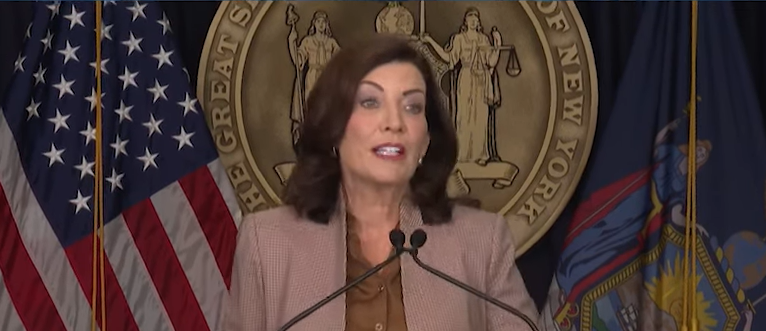Photo: YouTube\Twitter
Wednesday, Congresswoman Ayanna Pressley (MA-07) announced that H.R. 262, the Federal Death Penalty Prohibition Act of 2021, her bipartisan and bicameral legislation to prohibit the use of the death penalty at the federal level and require re-sentencing of those currently on death row, now has the support of over 90 Members of Congress and 265 national and grassroots organizations across the country.
The legislation was originally introduced by Rep. Pressley and Senator Dick Durbin (D-IL) with 18 co-sponsors in July 2019 following the U.S. Department of Justice’s announcement that it would resume the use of the death penalty. The lawmakers reintroduced the legislation in January 2021 with 78 co-sponsors across both chambers of Congress.
To view the full list of co-sponsors and endorsing organizations, click here.
Recently added co-sponsors of the legislation include Rep. Nikema Williams (D-GA), Donald McEachin (D-VA), Haley Stevens (D-MI), Paul Tonko (D-NY), David Cicilline (D-RI), Ritchie Torres (D-NY), Michael San Nicolas (D-GU), Bobby Scott (D-VA), Andy Levin (D-MI), Debbie Wasserman-Schultz (D-FL), Peter Meijer (R-MI), Robin Kelly (D-IL) and Senator Chris Coons (D-DE).
“Our nationwide, grassroots coalition to abolish the federal death penalty continues to grow, and the additional support we have gotten for our legislation is a testament to the power of this movement,” said Rep. Pressley. “It’s time for Congress to pass this bill in order to officially and permanently end the practice of state-sanctioned murder in the federal government. Let’s get this done.”
“The death penalty is deeply flawed and disproportionately imposed on Black and Brown and low-income people in America. Our bill follows the lead of 23 states, including Illinois, by finally putting an end to this failed and unjust policy. I thank Congresswoman Pressley and our bipartisan Congressional colleagues who have joined us in this effort,” Senator Durbin said.
“The death penalty is costly, ineffective, and morally unjust. We’ve known for a long time that it does not deter violent crime. The National Academy of Sciences reports that as many as one out of every 25 people on death row are actually innocent,” said Rep. Cicilline. “It’s time to end capital punishment in the United States.”
“The death penalty is an inhumane practice that disproportionately affects poor, Black & Brown Americans,” said Rep. Torres. “It is barbaric for a modern society to continue the unjust act of sentencing its citizens to death. We need to move forward by investing in our communities and reimagining our justice system, rather than perpetuating egregious violations of human rights. I am proud to join the effort led by House Democrats as a co-sponsor of the Federal Death Penalty Prohibition Act of 2021 to put an end to this antiquated and unjust federal policy.”
“I do not trust the government to never execute an innocent person,” said Rep. Meijer. “In 2017, Ledell Lee was executed in Arkansas for the murder of his neighbor. He maintained his innocence until his own death by lethal injection. This week – four years after Lee’s execution – DNA testing of the murder weapon showed a different man’s genetic material. Furthermore, the death penalty is a poor use of taxpayer dollars; the process of execution is more costly than life without parole. Individuals who commit violent crimes should live out their natural lives with the consequences of their actions. I am proud to cosponsor this bipartisan, bicameral bill to end federal death penalty sentencing and require resentencing of those who are currently on federal death row. I hope this measure advances swiftly through the House.”
Despite overwhelming evidence against the death penalty, the Trump administration executed 13 Americans since resuming federal executions for the first time in 17 years on July 14, 2020. Capital punishment is unjust, racist and defective. The United States stands alone among its peers in executing its own citizens, a barbaric punishment that denies the dignity and humanity of all people and is disproportionately applied to people who are Black, Latinx, and poor. For example, Black people make up less than 13 percent of the nation’s population while accounting for more than 42 percent of those on death row. A nationwide study found that at least 1 in 25 people sentenced to death are innocent, while research has shown that capital punishment does not deter crime.
Polling in 2019 demonstrated that the majority of Americans no longer support the death penalty. Many conservative leaders have called for an end to its use because it is costly, ineffective, and inaccurate. Carrying out these executions during the pandemic has been particularly expensive, with an estimated cost of more than $900,000 per execution.
The Federal Death Penalty Prohibition Act of 2021 would end the use of the death penalty by the federal government. Specifically, the bill would prohibit the imposition of the death penalty as punishment for any violation of federal law and would require the re-sentencing of those previously sentenced to death row. The legislation was originally introduced by Rep. Pressley and Senator Durbin in July 2019 following the U.S. Department of Justice’s announcement that it would resume the use of the death penalty.
The Federal Death Penalty Prohibition Act of 2021 is endorsed by 265 organizations. To view the full list, click here.
“More than 20% of all members of Congress are now co-sponsors of this historic bi-partisan legislation,” said Abraham Bonowitz, executive director of Death Penalty Action, a national advocacy group mobilizing support for HR 262 as part of its work opposing the death penalty. “Americans across the country, including nearly 300 organizations and their members, are calling on their Representatives and Senators to support HR 262 and SB 582, and urging that the Federal Death Penalty Prohibition Act of 2021 be brought up for debate as soon as possible. 23 states have abandoned the death penalty so far, and it is time to prohibit federal and military executions as well.”
“The death penalty is not about whether people deserve to die for the crimes they’ve committed; it’s about whether we deserve to kill when our system is compromised by racial bias, discrimination against the poor, unreliability, and the politics of power,” said Bryan Stevenson, Founder and Executive Director of the Equal Justice Initiative. “We are better than the death penalty.”
In January, Congresswoman Pressley and Congresswoman Cori Bush (D-MO) led more than 35 of their House colleagues in sending a letter to President Biden calling on him to commute the sentences of every person on federal death row. Later that month, Congresswoman Pressley and Reps. Adriano Espaillat (NY-13) and Robin Kelly (IL-02) wrote to then-Attorney General-nominee Judge Merrick B. Garland urging him to prioritize President Biden’s commitment to working with Congress to end the federal death penalty and incentivizing states to end capital punishment across the country.
In December 2020, Congresswoman Pressley led 41 of her House colleagues and three Representatives-Elect on a letter calling on President-Elect Joe Biden to end the use of the federal death penalty on his first day in office. In November 2020, Congresswoman Pressley and Senator Durbin, along with Senators Patrick Leahy and Cory Booker, wrote to Attorney General Bill Barr calling for a halt on all scheduled federal executions during the presidential transition period.







